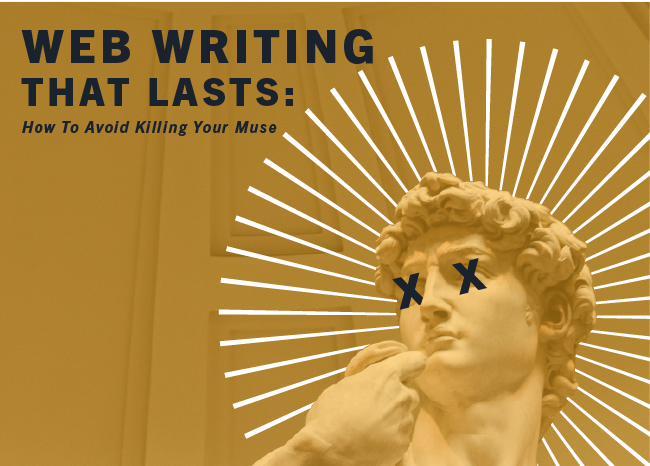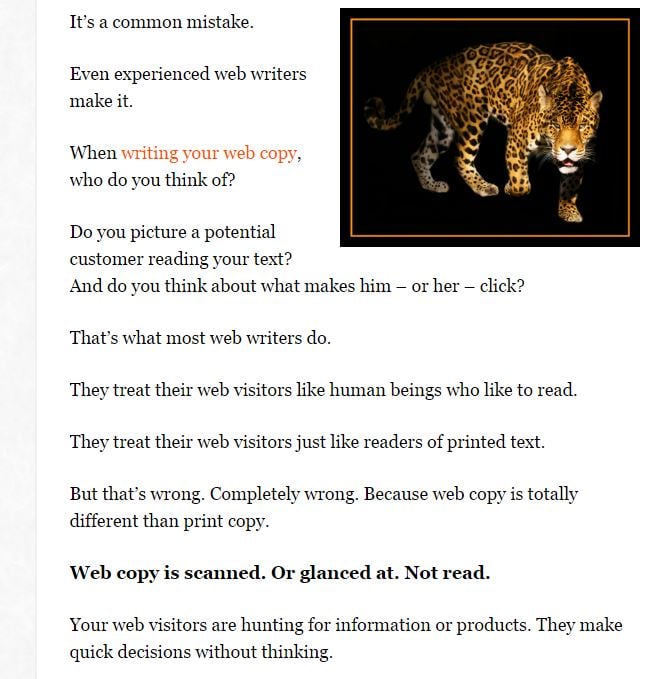What is it about a piece of great writing that makes us feel more excited and interested about a subject? What are the kinds of details that affect us so much and make us feel more alive?
The only writing that is really worth reading, in my opinion, is the kind that allows us to understand the world in a different way—writing that changes us, somehow.

Well-written pieces reach conclusions that, by the final sentence, manage to feel both inevitable and utterly surprising. Good writing does this via sensory imagery, as well as by allowing us to understand the world through someone else’s eyes. If you think I’m describing the effects of a powerful story or poem, you would be correct. However, I propose that the best nonfiction writing (including guest posts!) can change the reader’s perspective, as well.
Admittedly, I am approaching this topic from an artist’s perspective. As someone who writes poetry and creative nonfiction in my spare time, I am interested in differentiating my material from that which is so often found online—especially on marketing and business-oriented sites with advice for professionals.
A writer's perspective values originality, individualism, and all that is artful over 'catchy' titles and listicles that merely regurgitate the same ideas over and over again.
It’s Just a Matter of Time
Ultimately, if a writer is not contributing something of lasting value to the world, I believe that her time is poorly spent.
Articles that call for ways to utilize specific emotions in order to get your content to go viral, for example, are simply echoing the mandates of what constitutes great and lasting art: poems, stories, and essays that create a world unto themselves.
Artful writing makes you, the reader, see and feel things differently: that ability to elicit emotion is what constitutes great writing.

Image Source: waferboard
I believe any guest post should bring new and lasting value to the conversation being held on the given site. This ultimately boils down to quality over quantity: how can writers elevate the art of guest posting so as to make their writing have more in common with art than with dry lists of advice?
However, perhaps listicles have some place in the order of things: say, when you’re waiting in line to board a plane and you have five minutes that might otherwise be spent contemplating the universe or thinking of a line for your next poem after witnessing a quarrel between the couple in line before you.
Let me try again: you’re sitting in the waiting room like Elizabeth Bishop, so you decide to stare into your smartphone for comfort. If so, hopefully the listicles you encounter reveal themselves because of some agency, on your part: you decided to check out that article your SEO-savvy friend recommended to you about how to create great content for the web, by Rand Fishkin, for example. That would be useful, at least.
What Not to Do
A poor use of your time, in my opinion, would be the marketing article I cited, earlier. First of all, practically every sentence is its own paragraph. Talk about attempting to prevent you, the reader, from thinking!

This guide is a perfect example of the kind of advice that perpetuates bad writing. It starts off by recommending that website owners treat their online visitors like wild animals. Sure, the inverted pyramid is a decent idea, but the third piece of advice, “Don’t try to be clever or creative,” was one that really bothered me.
Right: let’s dumb everything down as much as possible, because readers don’t want to feel inspired; rather, we should pack their minds full of information like robots. That is our only function, after all: we are consumers in a capitalistic, materialistic, and shallow society. The role of creativity is apparently irrelevant.
This has never been true before, and it’s not true now. The Internet hasn’t turned humanity into unthinking robots designed to consume content.
Maria Konnikova put it perfectly in a New Yorker article entitled, ironically, “A List of Reasons Why Our Brains Love Lists”:
In the current media environment, a list is perfectly designed for our brain. We are drawn to it intuitively, we process it more efficiently, and we retain it with little effort. Faced with a detailed discussion of policies toward China or five insane buildings under construction in Shanghai, we tend to choose the latter bite-sized option, even when we know we will not be entirely satisfied by it. And that’s just fine, as long as we realize that our fast-food information diet is necessarily limited in content and nuance, and thus unlikely to contain the nutritional value of the more in-depth analysis of traditional articles that rely on paragraphs, not bullet points.
While we are naturally drawn to lists, which clearly hold a substantial amount of online sway, it’s important to resist cheapening our writing by capitulating to squirrel-mentality, so to speak. As Konnikova argues, people are likely to be left with an empty feeling after reading this type of clickbait—even though everyone does it, sometimes.
But if you compare that sick feeling you have after reading a shallow gossip article to the sense of accomplishment you feel after reading something that helps you to see the world more clearly--well, there’s no comparison.

Image Source: Javcon117
Creativity Style Tips: Why and How
Of course it’s important to attract people to your site. However, lowering the common denominator is not the best approach. It’s very possible to be both efficient and creative at the same time.
As mentioned before, efficient and strategic use of space can be done in an original, interesting way. Utilitarian use of space could be combined with creative imagery to really maximize the impact of the words. Kind of like poetry, perhaps? Yes, exactly that. This is what poets do to maximize the impact of a few short phrases. To inject a bit of art into your world, today, here’s an example of a narrative poem written by Anne Carson, one of my favorite lyric poets and essayists, that effectively illustrates a story:
V. SCREENDOOR
His mother stood at the ironing board lighting a cigarette and regarding Geryon.
-----
Outside the dark pink air
was already hot and alive with cries. Time to go to school, she said for the third time.
Her cool voice floated
over a pile of fresh tea towels and across the shadowy kitchen to where Geryon stood
at the screen door.
He would remember when he was past forty the dusty almost medieval smell
of the screen itself as it
pressed its grid onto his face. She was behind him now. This would be hard
for you if you were weak
but you're not weak, she said and neatened his little red wings and pushed him
out the door.
The title itself is powerful: many of us remember the sound and feel of a screen door in the summer, especially during childhood. Also, the figure of the mother is, of course, meaningful to most of us, and the smell of smoke is something easy to conjure that—when associated with a mother—immediately alerts us to the fact that something’s not quite right. Most mothers, if they do smoke, don’t typically smoke inside with their children in the same room—though this used to be more common, a la “Mad Men.”
So why is it so important to appeal to people using metaphoric language? Simplistic writing succeeds in communicating information, but it doesn’t do much else; whereas creative & illustration language that employs sensory imagery taps into emotions in a way that is more effective. And emotions are what inspire people to respond and share content.
How can we, as article writers, employ the same storytelling techniques? Let me give you some examples:
Annie Dillard’s lyric essay piece “Total Eclipse” begins with a descriptive paragraph that mimics an avalanche: similar to the rocks cascading down the slanted mountain face, the image of slipping and sliding down the side of a mountain is terrifying, and the nightmare setting she paints for the reader does a good job of mimicking the feeling of vertigo that must be inevitable in the face of an avalanche.
But what if you’re trying to write something that increases your traffic and audience, in addition to crafting beautiful sentences? Let’s go for a compromise: one fun way to accomplish this is via humor. I recently discovered a hilarious piece—recommended in an expanded version of Fishkin’s article on 10x content—on the horrors of going Paleo called “I Went Paleo and Now I Hate Everything.”
First of all, let’s begin with the title. It’s hilarious, and it’s what made me want to read the piece in the first place: something to think about the next time you’re crafting an article.
The article offers up a number of slapstick images and ridiculously hyperbolic examples of behavior: “Being Paleo has killed my will to live, so I’m too sad to snack. My abs look pretty damn good, but I suspect that’s from all the nights I spend wracked with sobs because I can’t eat anything fun.”

Image Source: tuckett
The use of hyperbole coupled with sensory details makes the writing vivid and effective. There are concrete actions coupled with clear, straightforward sentences that not only convey humor but also transmit information about what happened. In this way, the piece does double-duty as a narrative essay that is also making a point: Paleo is no fun, and the price is basically your everyday enjoyment of life via one of the simplest acts we have: eating a pleasurable meal.
Another example of a great cross between literary writing and writing with outstanding user experience is McSweeney’s Internet Tendency, a compendium of tongue-in-cheek essays, lists, imaginary letters, etc., compiled onto a narrow column-format page, making the text easy to read on a phone or a tablet while riding to work on the subway.
One recent piece, widely shared among friends and former MFA classmates who have taught college-level composition, is in the form of an imaginary letter written from a composition instructor to her students: “I Would Rather Do Anything Else Than Grade Your Final Papers.”
Of course, McSweeney’s does not sell adventure gear or energy drinks: rather, via publications like The Believer and other titles through McSweeney’s publishing imprint, they are in the business of selling literature—to those still interested in reading it.
Memory & Emotion
Stories have also been shown to be more memorable than mere facts: how much more memorable? Stories were shown to be twenty-two times more memorable than facts!
Why is this, do you think? It has to do with the power of emotions to evoke memories. If you feel something, that emotion is often tied to a number of specific, personal experiences. If a story or an image reminds you of a similar time in your life, it will be all-the-more powerful.
Acquiring the impetus to do something via empathy is more powerful than simply reading an isolated statistic or fact. This would explain why another tenant of neuromarketing is the employment of images that mirror what you would like your customers and potential customers to do.
For example, if your company is a manufacturer of surfboards, you should portray a surfer using one of your surfboards and having a wonderful time. If your customers see this image in action, their mirror neurons are likely to fire, making them empathize deeply with the person they are witnessing—therefore making them more likely to want to surf with one of your surfboards.
Take, for example, Red Bull or Patagonia’s advertising: both build a culture around adventure and culture, successfully tying their products to movements, places, or activities.
The best stories evoke the most powerful emotions—but five emotions, in particular, are shown to be prevalent among stories and content that ‘goes viral’:
- Curiosity.
- Amazement.
- Interest.
- Astonishment.
- And uncertainty.
Interestingly, studies also indicated that positive emotions are important to the effectiveness of a message. You don’t want to go around evoking pain, for example—lest you scare off more people than you attract.
Notice, however, that when you think of the most memorable stories, poems, and other works of art, do you think of happy images? Not necessarily.
The common thread that most of the above emotions have is a certain kind of originality and uniqueness that helps a piece stand out in the reader’s mind. There’s an element of not-knowing in feeling curiosity, and amazement that only comes as a result of something unexpected.

Image Source: Flickr/Vanessa Gutierrez
Interest is only piqued when a proposition is offered that makes a subject excited or drawn toward that prospect, and astonishment and uncertainty come as a result of being in unfamiliar or ambiguous territory, as well.
Think of the best stories you know. They are unpredictable and astonishing, leading us down a long, winding tunnel that is dark and mysterious, yet keeps us wanting to move forward to encounter what is around the curve.
To do this, we must surprise and delight the reader as well—not simply offer cheap thrills and predictable scare tactics. We have to paint intriguing pictures that are more nuanced and that take a bit more effort than clear-cut lists filled with bullet points and hard-hitting assertions illustrated by graphs and charts.
Realities: Online Writing, Integrity, & Ethical Considerations
We live in an era that is constantly being translated, represented, and reported online.
Marketing is largely comprised of online social media presence, digital ads that follow consumers from site to site, and backlink portfolios. In this era of catchy headlines and link-bait, it’s more important than ever to maintain integrity as the writers and originators of essays, poems, and stories—regardless of whether they were written as part of our own personal manuscripts or on assignment for a client.
Ask yourself this: could this piece stand alone, without any hyperlinks or external references to clients? Does it intend to educate, inspire, or enrich its readers’ lives? Or does it merely exist to generate more traffic for a particular site?
Rachael Yahne summed up the online writer’s dilemma quite succinctly, in a recent editorial:
"In this digital age, quality is now quantified by popularity. The more clicks, the more likes, the more views, the more important it is."
This is a depressing state of affairs for writers who want to maintain their personal brand. However, despite all the differentiation Yahne makes between marketers and writers, the reality of the online world is that many good writers also happen to be in the business of marketing.
Quality, long-form content is now valued by SEO strategists just as highly as it is sought after by freelance and independent writers. It is definitely a misconception to assume that content marketers in the business of guest posting don’t produce high-quality writing.
In fact, it is absolutely necessary to produce well-reasoned, thought-out pieces—and not simply because of Panda and Google’s new algorithms. It’s also necessary because, considering all the cheap, sensationalistic clickbait, listicles, and overly simplistic advertising out there, good writing serves as a respite and a refreshing exception to the rule.
* * *

Image Source: Flickr/Jean-Pierre Dalbéra
It can and should be your goal, if you are a writer for the web, to write pieces that last—in fact, to write pieces that you would be willing to revise or excerpt for inclusion in a print anthology or collection of essays. And yes, although I realize that writing for the web is different than writing for print, I believe that it’s possible to stand behind pieces produced as guest posts or for niche-specific sites as long as you’re producing original, creative, educational articles that say something different, every time.
Rather than writing for the sole benefit of link optimization or social media marketing, write for your readers. Write to add value to a site by saying something that hasn’t been said before. Write to create something unique, artful, and entertaining that will change your readers. You’ll thank me for it, later.

